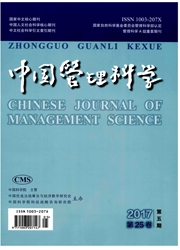

 中文摘要:
中文摘要:
通过将委托人和代理人公平偏好同时引入到多任务的委托代理模型中,研究国企高管和政府主管部门均具公平偏好下的国企高管最优薪酬机制。研究发现,在企业经营任务目标激励方面,当多任务成本函数为独立关系、互补关系或者替代性足够小的,国企委托人和代理人公平偏好将通过直接和间接的影响途径共同促进高管最优薪酬向公平工资回归,其中,间接影响表现为公平偏好先影响最优薪酬激励强度进而间接地影响总体薪酬水平;在此过程中,政府主管部门公平偏好和高管同情偏好对最优薪酬激励强度的影响,呈现出替代效应。在社会责任任务目标激励方面,显性薪酬激励不是有效的激励方式,因此政府应该借助于隐性激励方式来激励该任务目标的实现。研究还发现教育程度较高的高管具有更强的公平偏好心理。
 英文摘要:
英文摘要:
Through bringing fairness preference of principal and agent into multi-task principal-agent model, optimal incentive mechanism of SOEs' executives are studied based on fairness preference. The results show that in the aspect of production task, when multi-task cost function is independent and complementary or substitution is enough small, the fairness of SOEs' principal and agent would make optimal compensation back to fair level by the paths of both direct and indirect impact. And the indirect impact represents that fairness firstly impacts expect compensation by impacting optimal incentive intensity firstly. The fairness preference between principal and agent exists substitutive effect. In the aspect of social stability task, explicit incentive is not efficient way for this task, so government needs resort to implicit incentive. Besides, it can be found that the executive with higher education level has more strong fairness preference.
 同期刊论文项目
同期刊论文项目
 同项目期刊论文
同项目期刊论文
 Health care expenditure and GDP in African countries: evidence from semiparametric estimation with p
Health care expenditure and GDP in African countries: evidence from semiparametric estimation with p Consumption and portfolio rules for sophisticated individuals with stochastic quasi-hyperbolic disco
Consumption and portfolio rules for sophisticated individuals with stochastic quasi-hyperbolic disco Democracy, financial openness and global carbon dioxide emissions: Heterogeneity across existing emi
Democracy, financial openness and global carbon dioxide emissions: Heterogeneity across existing emi Working Capital Management, Corporate Performance, and Strategic Choices of the Wholesale and Retail
Working Capital Management, Corporate Performance, and Strategic Choices of the Wholesale and Retail Relationship between Strategic Risk and Return based on Ordinal Space: Panel Data Analysis on the Ch
Relationship between Strategic Risk and Return based on Ordinal Space: Panel Data Analysis on the Ch Random matrix theory analysis of cross-correlations in the US stock market: Evidence from Pearson&am
Random matrix theory analysis of cross-correlations in the US stock market: Evidence from Pearson&am Hyperbolic discounting predicts subadditive discounting for sophisticated and partially naive agents
Hyperbolic discounting predicts subadditive discounting for sophisticated and partially naive agents A decision engineering method to identify the competitive effects of working capital: a neural netwo
A decision engineering method to identify the competitive effects of working capital: a neural netwo Statistical Properties of the Foreign Exchange Network at Different Time Scales: Evidence from Detre
Statistical Properties of the Foreign Exchange Network at Different Time Scales: Evidence from Detre GBOM-oriented management of production disruption risk and optimization of supply chain construction
GBOM-oriented management of production disruption risk and optimization of supply chain construction 期刊信息
期刊信息
